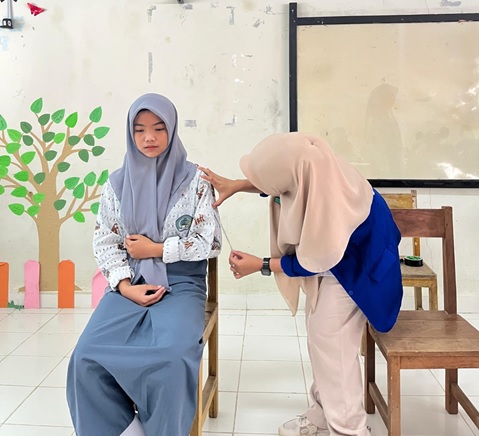Pengetahuan, Sikap dan Status Remaja Putri terkait Kurang Energi Kronik (KEK) di SMAN 2 Mamuju
DOI:
https://doi.org/10.55110/mcj.v4i2.241Keywords:
Chronic Energy Deficiency, Knowledge, Adolescent girls, Attitudes, Nutritional statusAbstract
Chronic Energy Deficiency (CED) among adolescent girls is a serious concern due to its long-term implications for reproductive health. This study aims to describe the knowledge, attitudes, and nutritional status of adolescent girls regarding CED at SMAN 2 Mamuju. A descriptive survey method with a quantitative approach was employed. The sample consisted of 165 female students from grades X and XI, selected through proportional simple random sampling. Data collection was conducted using questionnaires and anthropometric measurements, including Body Mass Index for Age (BMI/Age) and Mid-Upper Arm Circumference (MUAC). The results showed that the majority of respondents had moderate knowledge (50.9%) and a positive attitude (97.6%) toward CED. Nutritional status based on BMI/Age indicated that most adolescents had good nutritional status (81.2%), whereas MUAC measurements revealed that 47.9% were at risk of CED. These findings highlight a discrepancy between knowledge and positive attitudes versus actual practices in maintaining proper nutrition among adolescent girls. Continuous, practice-based nutrition education involving schools, healthcare providers, and families is needed to reduce the prevalence of CED in this population.
Downloads
References
Hasyim, M., Arief, E., & Nurbaya, N. (2023). The Effect of Peer Assistance on Adherence to Consuming Iron Tablets and Anemia Status among Young Female Adolescents. Jurnal Bidan Cerdas, 5(3), 121–127. https://jurnal.poltekkespalu.ac.id/index.php/JBC/article/view/2710
Kemenkes RI. (2021). Laporan Kinerja Kementerian Kesehatan 2021. Kementrian Kesehatan RI. https://upk.kemkes.go.id/new/laporan-akuntabilitas-kinerja-lakip-unit-pelayanan-kesehatan-tahun-2021
Kemenkes RI. (2023). Survei Kesehatan Indonesia (SKI). In Kemenkes RI. https://www.badankebijakan.kemkes.go.id/hasil-ski-2023/
Khusun, H., & Wiradnyani, L. A. (2020). Promisi Gizi Berbasis Sekolah di Indonesia. In SEAMEO RECFON (Vol. 11, Issue 1). SEAMEO RECFON. https://www.seameo-recfon.org/wp-content/uploads/Modul_SEA-SBNP_Indonesia-Ina-version_140125-e-book-1.pdf
Muchtar, N. L., Hartono, R., Fanny, L., & Sirajuddin, S. (2023). Edukasi Gizi Seimbang Menggunakan Media Leaflet Mempengaruhi Pencegahan Kurang Energi Kronik (KEK) Remaja Putri di SMP Negeri 12 Kota Makassar. Mando Care Jurnal, 2(2), 34–40. https://doi.org/10.55110/mcj.v2i2.131
Najdah, N., Nurbaya, N., & Irwan, Z. (2024). Kebiasaan makan dan status gizi pada remaja di mamuju menggunakan adolescents’ food habits checklist. Jurnal SAGO Gizi Dan Kesehatan, 5(2), 540. https://doi.org/10.30867/gikes.v5i2.1678
Noviyanti, R. D., & Marfuah, D. (2019). Hubungan Pengetahuan Gizi, Aktivitas Fisk, dan Pola Makan terhadap Status Gizi Remaja. University Research Colloquium, 421–426. https://web.archive.org/web/20180410202027/http://journal.ummgl.ac.id/index.php/urecol/article/download/1059/934
Nurbaya, N. (2020). Investing in Nutrition Literacy to Reduce Stunting in Indonesia. SEAMEO RECFON, 1–23. https://www.researchgate.net/publication/344199215_Investing_in_Nutrition_Literacy_to_Reduce_Stunting_in_Indonesia
Nurbaya, N., & Najdah, N. (2023). Food Security Status and Coping Strategies Among Adolescents During the Covid-19 Pandemic in Mamuju. Poltekita : Jurnal Ilmu Kesehatan, 17(1), 130–136. https://doi.org/10.33860/jik.v17i1.1894
Nurbaya, N., Najdah, N., Irwan, Z., Yudianti, Y., Nurliah, N., Rasmaniar, R., & Nurlaela, E. (2025). Exploration of Adolescent Health Services and Utilization in Mamuju District, West Sulawesi. Journal of Public Health for Tropical and Coastal Region, 8(1), 51–58. https://doi.org/10.14710/jphtcr.v8i1.25518
Nurmasyita, Widjanarko, B., & Margawati, A. (2016). Pengaruh Intervensi Pendidikan Gizi terhadap Peningkatan Pengetahuan Gizi, Perubahan Asupan Zat Gizi dan Indeks Massa Tubuh Remaja Kelebihan Berat Badan. Jurnal Gizi Indonesia (The Indonesian Journal of Nutrition), 4(1), 38–47. https://ejournal.undip.ac.id/index.php/jgi/article/view/12326
Purba, N. P., Kirani, N., Sitepu, A. S. B., Siregar, I. R., Priantono, D., Partisya, N. M., Ulandari, U., & Ayu, D. (2024). Faktor-Faktor Yang Mempengaruhi Status Gizi Remaja Mts Al-Washliyah Desa Celawan Kec. Pantai Cermin Kab. Serdang Bedagai. Jurnal Keperawatan Dan Kesehatan Masyarakat Cendekia Utama, 13(1), 72. https://doi.org/10.31596/jcu.v13i1.2128
Raghupathi, V., & Raghupathi, W. (2020). The influence of education on health: an empirical assessment of OECD countries for the period 1995–2015. Archives of Public Health, 78(1), 20. https://doi.org/10.1186/s13690-020-00402-5
Solehati, T., Pramukti, I., Rahmat, A., & Kosasih, C. E. (2022). Determinants of Adolescent Reproductive Health in West Java Indonesia: A Cross-Sectional Study. International Journal of Environmental Research and Public Health, 19(19), 11927. https://doi.org/10.3390/ijerph191911927
Telisa, I., & Eliza, E. (2020). Asupan zat gizi makro, asupan zat besi, kadar haemoglobin dan risiko kurang energi kronis pada remaja putri. AcTion: Aceh Nutrition Journal, 5(1), 80. https://doi.org/10.30867/action.v5i1.241
Zaki, I., & Sari, H. P. (2019). Edukasi Gizi Berbasis Media Sosial Meningkatkan Pengetahuan Dan Asupan Energi- Protein Remaja Putri Dengan Kurang Energi Kronik (KEK). GIZI INDONESIA, 42(2), 111. https://doi.org/10.36457/gizindo.v42i2.469

Downloads
Published
How to Cite
Issue
Section
License
Copyright (c) 2025 Mando Care Jurnal

This work is licensed under a Creative Commons Attribution-ShareAlike 4.0 International License.











